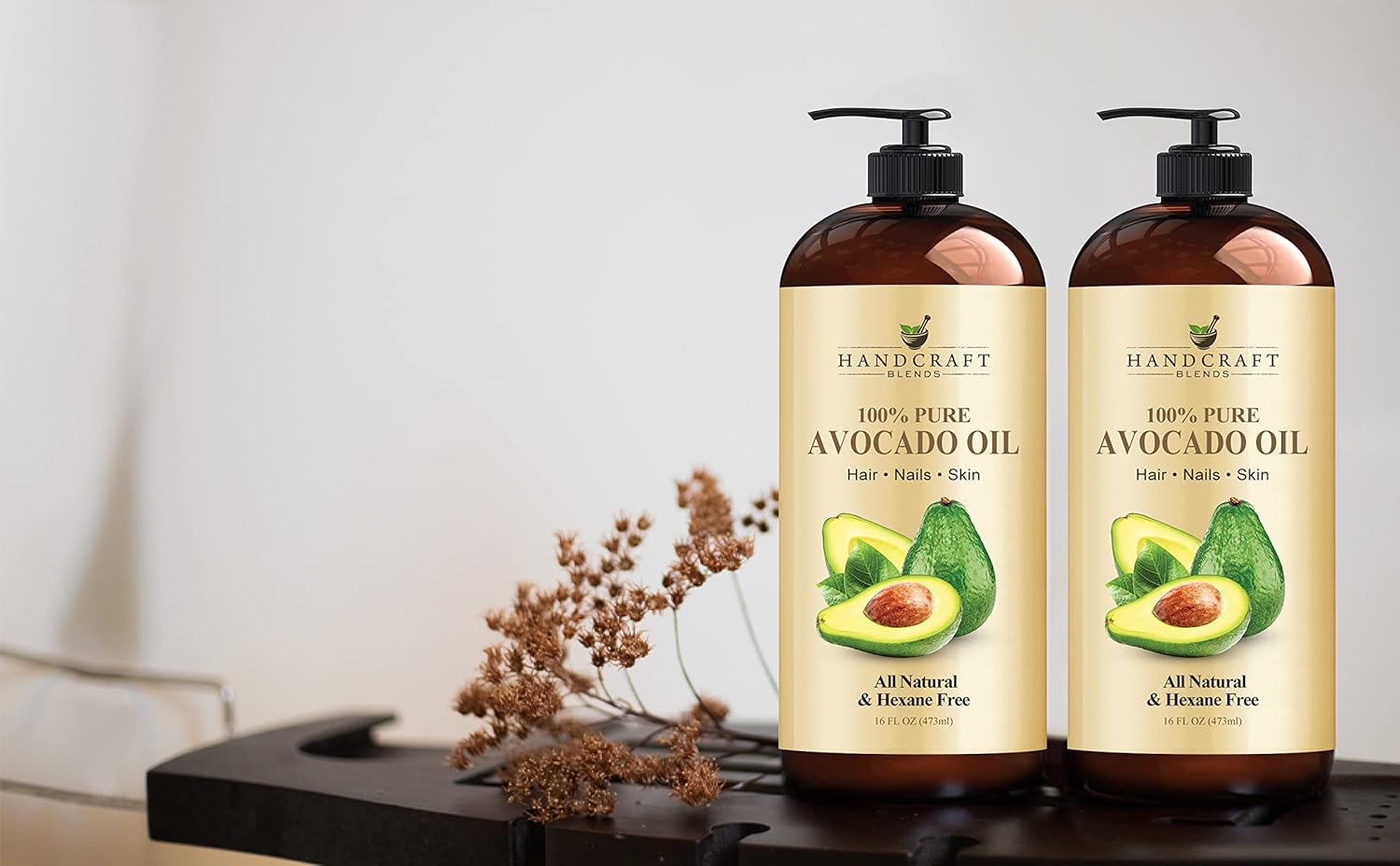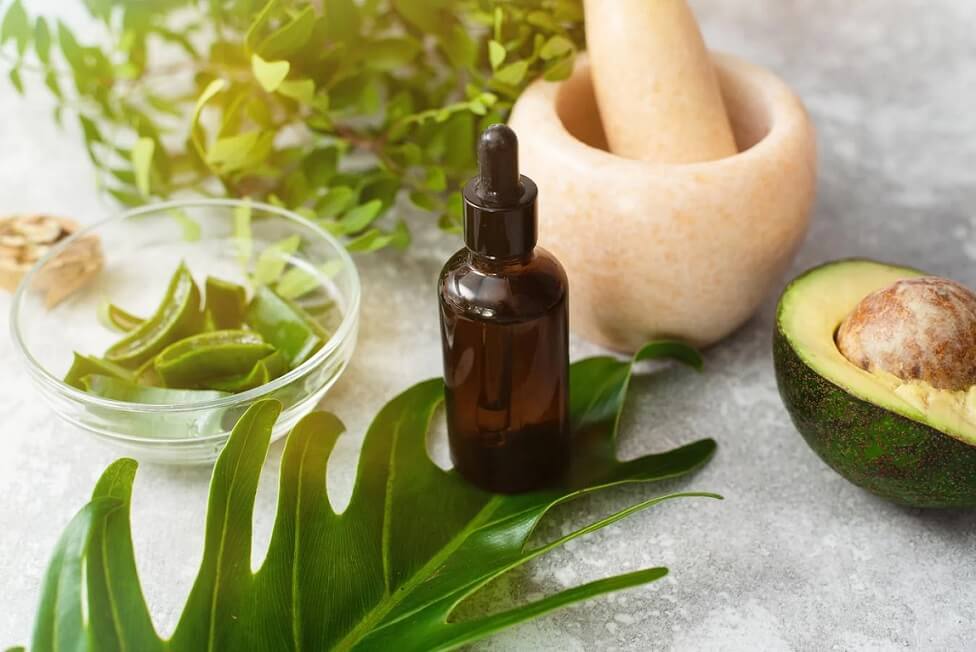Avocado oil is made by pressing the flesh of avocados — similar to how olives are used to make olive oil. It’s edible and often used like olive oil in recipes due to its high smoke point and neutral flavor. But avocado oil is much more than just a cooking ingredient. It can also be applied to the skin. Here’s everything you need to know about using avocado oil as a beauty product.
Avocado Oil For Skin: How It Works
Avocado oil has been used as a skincare product for centuries. In fact, there’s a good chance you’ve used avocado oil on your own skin even without even realizing it, as it’s an ingredient found in many skincare products.
Due to its hydrating properties, avocado oil is an ingredient in beauty products specifically formulated for those with dry skin. It can also be applied straight to your face — no dilution required.
With its high content of fat and vitamins, avocado oil is a great choice for those seeking natural, soothing hydration. In this article, we’ll explore avocado oil’s benefits, uses, and potential side effects for your skin.
Benefits of Using Avocado Oil For Skin

- Moisturizes and Nourishes: Avocado oil is a rich source of fatty acids, vitamin E, and antioxidants that hydrate and nourish the skin. Hydrated skin can increase firmness and elasticity, which helps the skin look fresh and healthy. The high content of oleic acid (a monounsaturated fat) in avocado oil can help to penetrate the skin deeply, providing long-lasting moisture and a healthy, glowing complexion.
- Reduces Inflammation: Avocado oil contains anti-inflammatory compounds that help reduce redness, inflammation, and irritation of the skin. This makes it a great choice for those with sensitive skin or those who suffer from conditions like eczema or psoriasis — though it’s important to note that you should consult with your doctor about the best treatments for diagnosed skin conditions.
- Protects Skin From Damage: Avocado oil contains natural, sun-blocking ingredients like lutein that can help to protect the skin from harmful UV rays. While it shouldn’t be used as a replacement for sunscreen, incorporating avocado oil into your skincare routine can provide an added layer of protection against sun damage.
Various Uses of Avocado Oil
From makeup remover to scalp treatment, avocado has a variety of skincare uses. Here are some of the most common:
- Moisturizer: Avocado oil can be used as a standalone moisturizer, or it can be added to face or body lotion. Simply apply a small amount of oil to the skin and massage it in gently, focusing on any dry or rough areas. It’s also a great ingredient for a DIY face mask.
- Massage Oil: For the same reasons that make it a good moisturizer, avocado oil is a solid choice to use as a massage oil. Just warm up the oil and massage it into the skin. You can even add a few drops of your favorite essential oil for an aromatherapeutic effect.
- Scalp Treatment: For a dry, flaky scalp, apply a small amount of avocado oil and let it sit. Then, massage gently for a few minutes before shampooing.
- Makeup Remover: Like many oils, avocado oil is great at picking up debris from the face, which makes it an efficient makeup remover. Apply a small amount of oil to a cotton ball or pad and wipe over the face gently to remove makeup.

Side Effects of Avocado Oil For Skin
Though avocado oil is derived from a plant, it’s not as concentrated as an essential oil, so the risk of irritation when applied directly to the skin is lower. That said, there’s always a risk of irritation or an allergic reaction, which is why it’s important to do a patch test before using any new skincare product, especially if you have sensitive skin or allergies.
Skin Types That Should Avoid Avocado Oil
Avocado oil is somewhat comedogenic, which means that it can clog pores. For that reason, it may not be suitable for acne-prone skin. Again, a patch test may be helpful before applying avocado oil to your face, especially if your skin is more oily than dry. Even if you don’t have acne-prone skin, it’s a good idea to start by mixing avocado oil into lotion so that it’s diluted, working your way up if needed.
What To Look For When Buying Avocado Oil For Your Skin

- Pure, Cold-Pressed Avocado Oil: Cold-pressing is a method of extracting oil from a plant that’s completely mechanical, meaning no heat or chemicals are used. Compared to other methods, cold-pressing can retain more of the oil’s nutrients, giving you a better chance of seeing the positive results associated with the oil.
- Avoid Additives: Some avocado oils may contain additives like preservatives, fragrances, or even flavors, since avocado oil is often used for cooking. These additives can irritate the skin, so try to find single-ingredient avocado oil.
- Choose A Dark Glass Bottle: Like most oils, avocado oil can degrade over time when exposed to light and air. Look for an oil packaged in a dark glass bottle, which will help protect it from light and extend its shelf life, as skincare doesn’t last forever. You can also transfer your avocado oil to a reusable dark glass container if it doesn’t come in one.
A Toast To Avocado Oil
Avocado oil is a natural substance that can help hydrate and sooth your skin. From its deep-penetrating moisturizing properties to its anti-inflammatory benefits, avocado oil is the ideal choice for those seeking a natural and effective alternative to traditional moisturizing skincare products.
As with any skincare product, it’s important to consider your individual skin type and needs, and don’t forget to do a patch test before using a new product for the first time.





